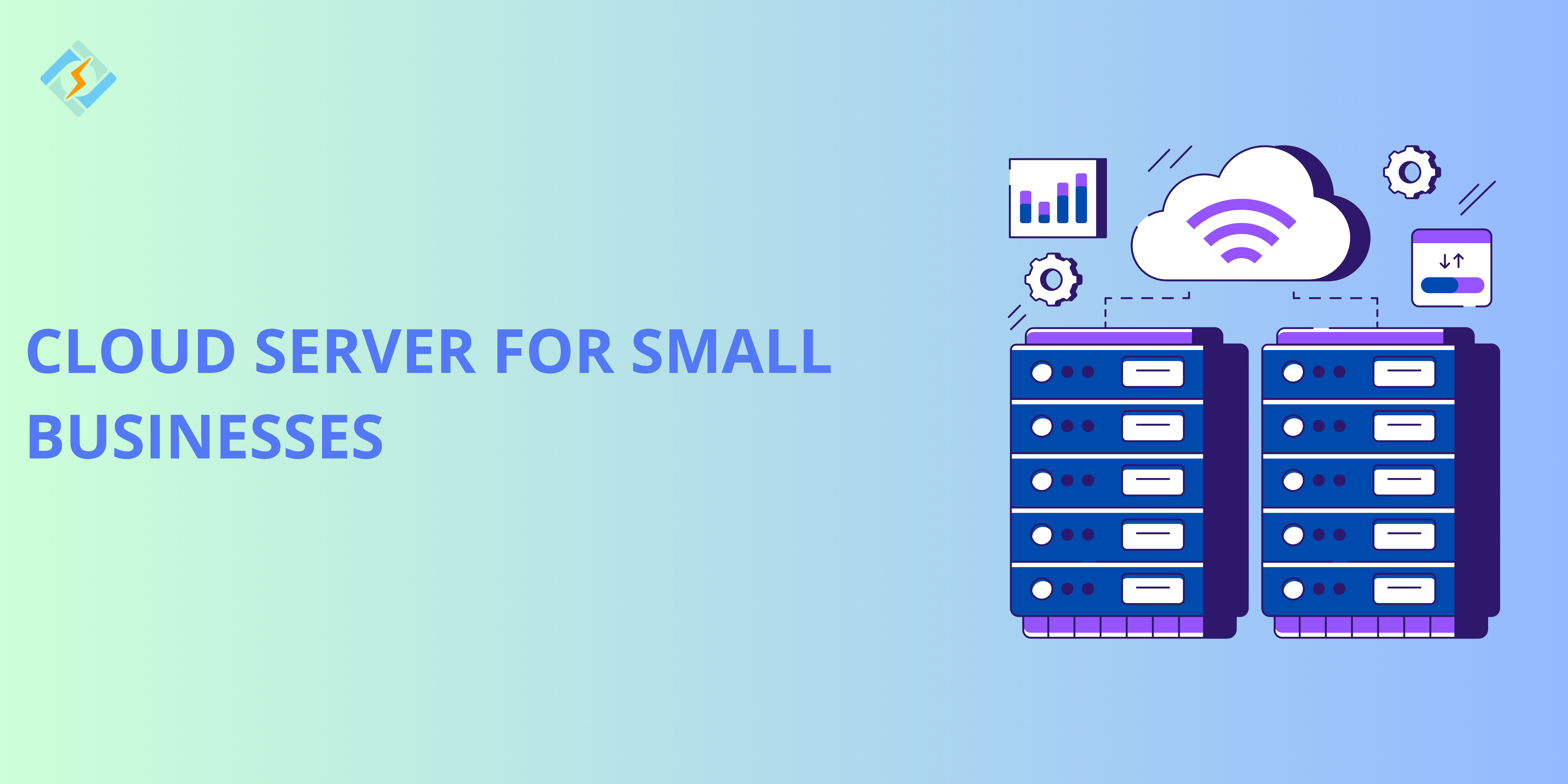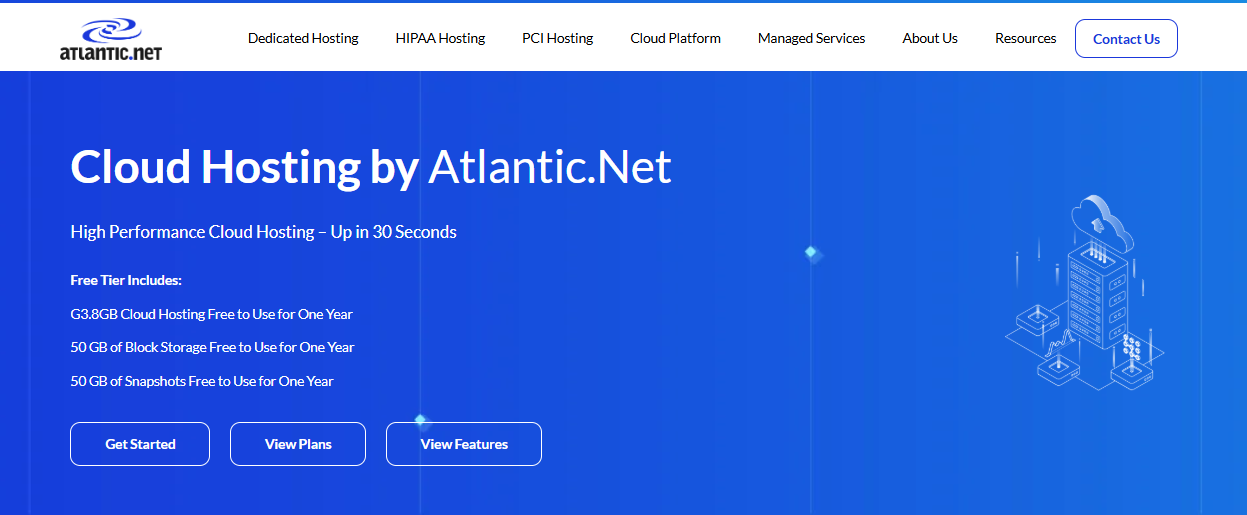Data protection is one of the key aspects of organizations due to its sensitive nature. This is where cloud servers come into play by providing crucial solutions for organizations looking for economical and political solutions. It is essential to employ a cloud server for small business as they need to focus on data protection, improved accessibility, and cost effective scalability.
In this article, we will explore the top 10 cloud server solutions for small businesses along with their pros, cons, and costing.
Atlantic.Net
Atlantic.Net offers cloud hosting with both Windows and Linux options, RAID-10 storage, and eight global data center regions for low-latency performance wherever your customers are located. With over 31 years in business and millions of servers deployed for customers in 100+ countries, they deliver enterprise-grade reliability that small businesses can depend on. They’re currently offering a free G3.8GB server and 50GB of snapshots for one full year – perfect for startups looking to test their services risk-free.
Pros:
- 8 global data center regions for worldwide coverage
- Always-available U.S.-based support at no extra cost
- HIPAA and PCI compliance capabilities for regulated industries
Cons:
Get exclusive access to all things tech-savvy, and be the first to receive
the latest updates directly in your inbox.
- Some advanced enterprise features require higher-tier plans
- Premium compliance features aimed at larger organizations
- Windows hosting may have higher pricing than Linux-only competitors
Link: https://www.atlantic.net/cloud-platform/cloud-hosting/
What is a Cloud Server?
A cloud server is a virtual server that provides storage, processing power, and applications over the internet. They are a part of cloud computing that is accessed on demand by many users.
How do cloud servers work?
Cloud servers are hosted by a cloud service provider using virtualization software to divide a physical server into multiple virtual servers. A user would access the server remotely through the internet and pay as they go.
Cloud servers are cost effective since you only pay for the resources that are used with no upfront or operational expenses. Cloud servers are also extremely flexible and scalable. Freelance Invoice Receipt Templates
Cloud Server for Small Business – Top 10 Picks
We compiled a list of our top picks for cloud servers that are changing the game with their revolutionary features and affordable pricing.
AWS Lightsail
AWS Lightsail is an easy to use cloud server for your small business offering a simple pricing model and pre-configured instances for quick deployment. Businesses can also seamlessly integrate AWS lightsail with other AWS services.
Pros:
- Fixed, predictable pricing
- Easy setup with pre-configured instances
- Seamless integration with AWS services
Cons:
- Limited customization compared to full AWS EC2
- Higher cost for scaling beyond initial plans
- Limited regional availability
Google Cloud Compute Engine
Google Cloud Compute Engine is a powerful and flexible virtual machine with scalable pay as you use model. It is an ideal solution for businesses looking to leverage AI, analytics, and global infrastructure.

Pros:
- High-performance cloud infrastructure
- Global data centers ensure low latency
- Strong AI and analytics integration
Cons:
- Steeper learning curve for beginners
- Pricing can be complex with multiple factors
- Fewer user-friendly tools for small businesses
Microsoft Azure Virtual Machines
Microsoft Azure Virtual Machines are enterprise grade computing, ideal for businesses that rely on Windows based applications. It provides hybrid cloud capabilities, allowing businesses with on-premises and cloud infrastructure.
Pros:
- Best for Windows-based workloads
- Hybrid cloud support for on-premise integration
- AI and machine learning tools available
Cons:
- Can be expensive for small businesses
- Complexity in setup and management
- Performance can be inconsistent without proper configurations
Linode (Akamai Cloud)
Linode from Akamai Cloud is another cloud server for small business that is cost-effective and developer-friendly hosting provider. It offers SSD storage and easy management tools, making it an excellent pick for startups and solo developers.
Pros:
- Affordable and predictable pricing
- Easy-to-use control panel
- Good performance with SSD-based servers
Cons:
- Limited enterprise-grade features
- Not as many global data centers as competitors
- Customer support can be slow at times
DigitalOcean Droplets
Droplets by DigitalOCean is a developer-optimised cloud server providing customized solutions for small business with one-click deployment, predictable pricing, and strong community support.
Pros:
- Simple and transparent pricing
- One-click deployment for apps like WordPress
- Strong developer community and documentation
Cons:
- Limited scalability for large businesses
- Not ideal for Windows-based applications
- Fewer managed services compared to AWS or Azure
Vultr Cloud Compute
Vultr cloud computing offers services with flexible pricing options on both hourly and monthly plans. With multiple data centers, it provides a reliable and budget-friendly cloud server for small businesses.
Pros:
- Affordable with hourly and monthly billing options
- Multiple global data centers
- Easy-to-use interface for server management
Cons:
- No advanced AI or analytics tools
- Limited customer support options
- Not ideal for high-compute workloads
Kamatera
Kamatera offers fully customizable cloud servers with budget friendly pricing plans. Businesses can choose their CPU, RAM, and storage configurations, making it a flexible solution for growing teams.
Pros:
- Fully customizable cloud server configurations
- 30-day free trial available
- Scales easily for growing businesses
Cons:
- Higher learning curve for customization
- Can get expensive with add-ons
- Limited beginner-friendly features
IONOS Cloud Server
IONOS offers a safe and affordable cloud server for small business with a special focus on data protection. It provides managed services and security features, making it a hassle free hosting solution for small businesses.
Pros:
- Budget-friendly cloud hosting
- Strong security and data protection
- Managed services available for non-technical users
Cons:
- Limited global presence compared to AWS/Azure
- Interface can be confusing for new users
- Less flexibility in server configurations
Alibaba Cloud Elastic Compute Service (ECS)
Alibaba Cloud ECS is a flexible and budget friendly cloud server, focusing on the Asian market. It provides strong AI and big data features for business growth.
Pros:
- Strong presence in Asia with multiple data centers
- Competitive pricing for cloud computing
- AI and big data capabilities for advanced needs
Cons:
- Not as user-friendly as AWS or Google Cloud
- Limited customer support outside Asia
- Documentation can be inconsistent for international users
Hostinger Cloud Hosting
Hostinger offers a cost effective and beginner friendly cloud hosting solution that is an ideal pick for small businesses that need an easy to use and reliable service. It also offers automatic daily backups and a centralized control panel.
Pros:
- Affordable and beginner-friendly
- Automatic daily backups
- Simple control panel for easy management
Cons:
- Limited scalability for growing businesses
- Fewer data centers compared to larger providers
- Not ideal for high-performance workloads
Cloud Server for Small Business – Quick Comparison Table
| Provider | Pricing Model | Ease of Use | Scalability | Best For |
| AWS Lightsail | Fixed monthly plans | Easy | High | General small business use |
| Google Cloud Compute Engine | Pay-as-you-go | Moderate | High | AI, analytics, and scalability |
| Microsoft Azure Virtual Machines | Pay-as-you-go | Moderate | High | Windows-based workloads |
| Linode (Akamai Cloud) | Fixed & pay-as-you-go | Easy | High | Cost-effective Linux hosting |
| DigitalOcean Droplets | Fixed monthly plans | Easy | Medium | Developer-friendly apps |
| Vultr Cloud Compute | Fixed & hourly plans | Easy | Medium | Budget-conscious businesses |
| Kamatera | Flexible hourly/monthly | Moderate | High | Custom cloud configurations |
| IONOS Cloud Server | Fixed monthly plans | Easy | Medium | Affordable managed hosting |
| Alibaba Cloud ECS | Pay-as-you-go | Moderate | High | Businesses targeting Asia |
| Hostinger Cloud Hosting | Fixed monthly plans | Easy | Low | Budget-friendly shared cloud |
Using CyberPanel with cloud servers
CyberPanel – a web hosting control panel – helps manage cloud servers with easy one-click setup. CyberPanel will help you from assisting setup to optimizing for speed using one centralized dashboard.
Conclusion – Cloud Server For Small Business
Choosing the right cloud server for small business depends on your specific needs, such as budget, scalability, ease of use, and performance. Ultimately, the best cloud server should align with your business growth, technical expertise, and operational requirements. Whether you need a cost-effective, scalable, or easy-to-use cloud solution, this guide helps you make an informed decision.
Frequently Asked Questions
1. What is a cloud server for small business?
A cloud server is a virtual server that provides businesses with computing resources like storage, networking, and processing power. It allows small businesses to run websites, applications, and data securely without needing physical hardware.
2. How much does a cloud server cost for small businesses?
Cloud server pricing varies based on provider and resources. Entry-level plans start at around $5–$10 per month (Linode, DigitalOcean, Vultr), while enterprise solutions like AWS or Azure may cost more depending on usage.
3. Can I switch my business to a cloud server easily?
Yes, many providers offer migration tools and managed services to help transfer your data from on-premise or other cloud servers with minimal downtime.




